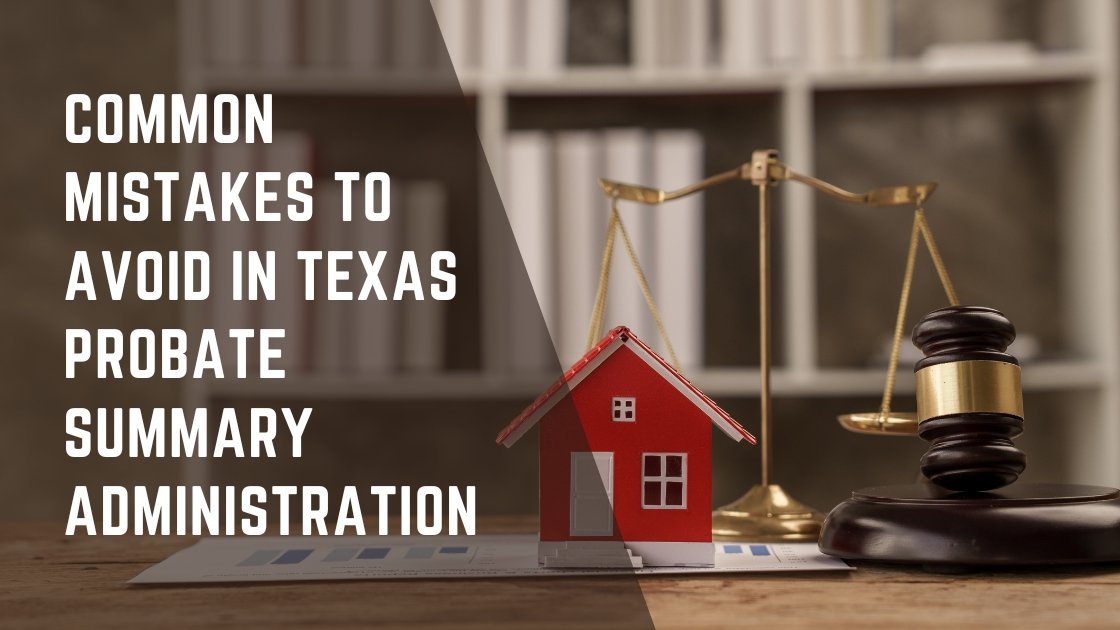Introduction
Navigating the intricacies of probate can be a daunting task, particularly in Texas where specific laws and procedures govern estate administration. Probate is the legal process through which a deceased person’s estate is settled, ensuring that debts are paid and remaining assets are distributed to heirs and beneficiaries. Within this process, Texas Probate Summary Administration stands out as a streamlined approach for estates with limited assets, offering a faster and more cost-effective alternative to traditional probate.
Understanding the Texas Probate Summary Administration is essential for anyone tasked with managing or inheriting an estate. This article delves into the nuances of summary administration, focusing specifically on common mistakes that can hinder the process and lead to delays or complications. By identifying these pitfalls early on and providing actionable insights, we aim to empower executors, administrators, and beneficiaries to navigate probate more effectively.
What is the Texas Probate Summary Administration?
Texas Probate Summary Administration offers a streamlined approach to settling estates with limited assets. It is available when the estate’s total value, excluding homestead and exempt property, does not exceed a specific threshold. Unlike regular probate, which involves extensive court supervision, summary administration is faster and more cost-effective. Eligibility depends on the asset value and specific legal criteria, making it essential to accurately determine eligibility before proceeding. An individual can file a petition for summary administration 6 months after being appointed as Administrator or Executor of an estate.
Common Mistakes in Texas Probate Summary Administration
Mistake #1: Incorrect Determination of Eligibility
Determining eligibility for Summary Administration requires a precise evaluation of the estate’s total worth and the nature of its assets. Misjudging these factors can lead to delays and unnecessary complications. For instance, failing to exclude certain exempt assets or inaccurately assessing the estate’s total value could render an application for summary administration invalid.
Mistake #2: Incomplete Documentation
Successful summary administration hinges on thorough and accurate documentation. Required documents typically include an inventory of assets, an affidavit of heirship, and a list of creditors. Incomplete or incorrect paperwork can stall the process, prompting the court to request additional information, thereby prolonging estate settlement.
Mistake #3: Failure to Meet Deadlines or Procedural Requirements
Adherence to timelines and procedural requirements is critical in summary administration. Missing deadlines for document submission or failing to adhere to procedural guidelines specified by Texas probate law can lead to dismissal of the application or additional court hearings, extending the probate process unnecessarily.
Mistake #4: Improper Handling of Creditor Claims
Addressing creditor claims promptly and accurately is pivotal in summary administration. Creditors must be notified within the stipulated timeframe, and their claims adequately addressed. Neglecting creditor claims or mishandling debt settlements can result in legal disputes or delays in estate distribution.
Mistake #5: Neglecting Tax Implications
Ignoring potential tax obligations can have significant consequences in summary administration. Estates may be subject to federal and state taxes, depending on various factors such as asset type and inheritance laws. Seeking professional tax advice ensures compliance with tax regulations and minimizes tax liabilities for beneficiaries.
Tips for Avoiding These Mistakes
Consult with a Probate Attorney:
Engage a qualified probate attorney, who specializes in summary administration. They can provide expert guidance on eligibility criteria, procedural requirements, and legal obligations specific to Texas probate law. A knowledgeable attorney ensures all necessary documents are prepared accurately and submitted on time, minimizing the risk of procedural errors that could delay estate settlement.
Understand Eligibility Criteria:
Thoroughly assess whether the estate qualifies for Summary Administration under Texas law. Eligibility criteria typically involve the total value of the estate, excluding exempt and homestead property. Properly evaluating eligibility ensures that the chosen probate method aligns with legal requirements, preventing complications and potential challenges during the process.
Organize and Maintain Complete Documentation:
Compile and maintain comprehensive documentation throughout the probate process. Required documents may include the application for summary administration, inventory of assets, affidavit of heirship, and creditor notifications. Ensure all information is accurate, up-to-date, and properly organized to expedite court proceedings and minimize requests for additional information.
Adhere to Timelines and Procedural Requirements:
Strictly adhere to deadlines and procedural guidelines mandated by Texas probate law. Missing deadlines for document submission or failing to comply with procedural requirements can result in delays and additional court hearings. Maintain a calendar or timeline to track key milestones, ensuring all tasks are completed within the specified timeframe to avoid unnecessary complications.
Communicate Effectively with Stakeholders:
Maintain clear and open communication with beneficiaries, creditors, and other stakeholders involved in the probate process. Promptly address inquiries, provide updates on estate proceedings, and collaborate with all parties to resolve any potential disputes or challenges swiftly. Effective communication fosters transparency and cooperation, facilitating a smoother probate experience for everyone involved.
Seek Professional Tax Advice:
Understand and address potential tax implications associated with estate administration. Consult with a tax professional or accountant to assess any tax obligations, including federal and state estate taxes, income taxes, and inheritance taxes. Proactive tax planning can help minimize tax liabilities for beneficiaries and ensure compliance with tax laws, avoiding penalties or delays in asset distribution.
Review and Update Estate Plans Regularly:
Encourage individuals to review and update their estate plans regularly to reflect changes in personal circumstances or asset holdings. Keeping estate plans current reduces the likelihood of discrepancies or challenges during probate, ensuring that the intended distribution of assets aligns with the decedent’s wishes.
Conclusion
Understanding and avoiding common mistakes in Texas probate summary administration can save you time, money, and stress. By staying informed and seeking professional advice when needed, you can navigate the process more smoothly. If you are in Houston and need assistance with probate summary administration, be sure to consult with a probate summary administration attorney in Houston, TX to ensure everything is handled correctly. Taking these steps can help you honor your loved one’s wishes and manage their estate efficiently.



